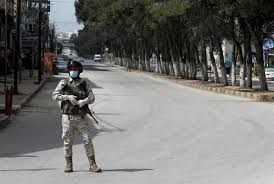Drastic, early action seems to keep a lid on Jordan's COVID-19 outbreak

CBS News
Amman — Jordan has been under total lockdown since March 14. After just a few COVID-19 cases appeared around the country, the government took extraordinary measures, including implementing strict emergency laws. The Jordan Armed Forces and police were deployed to patrol the kingdom's streets, enforcing a strict curfew.
The hardest-hit part of the country was the northern city of Irbid, Jordan's second most populous. There, against government advice, more than 450 people attended a wedding. It turned out the bride's father and sister both had contracted the new coronavirus abroad, and cases linked to the wedding soon spiked. The government imposed the harshest of all measures on the city, completely cutting its more than one million residents off from the rest of the country.
Every day at 6:00 p.m. sirens echo around the country announcing the curfew, which remains in place until 10 a.m. the next morning.
During the day people are only allowed to walk around their own neighborhoods to shop at local stores — provided they keep the recommended distance between themselves and others. The use of vehicles is strictly prohibited, except for those with permits to continue conducting essential business for the emergency services and supply chains. All public meetings, including prayers, church services, and funerals have been banned.
First-time violators of the new rules face a fine of about $140, which doubles for a second offense and can lead to a prison sentence after that. Dozens of police checkpoints have been set up around the country to check the permits of people on the move. Those caught breaking the rules are put in jail and their cars are impounded. So far, more than 1,200 cars have been seized and police issued more than 300 fines on Tuesday alone.
Despite the restrictions, and the fact that Jordan was already struggling with poverty and high unemployment before the virus devastated peoples' livelihoods, few citizens are complaining. A recent poll by the Strategic Studies Center found that 74% of Jordanians approve of the measures taken by their government.
To date, the number of confirmed coronavirus cases in Jordan is just 274, including 5 deaths. Those figures are low compared to Jordan's neighbors: According to Johns Hopkins University data, Israel has more than 5,500 cases, Saudi Arabia has 1,563 and Iraq almost 700.
Officials estimate that by April 4, they will be able to account for all COVID-19 cases that have entered Jordan from abroad. All Jordanian nationals arriving from abroad have been forced to quarantine for 14 days. More than 5,000 of these people have been temporarily housed in the rooms of otherwise-deserted five-star hotels in Amman and the Dead Sea resorts, where they're screened for symptoms for two weeks before being allowed to go home.
been forced to quarantine for 14 days. More than 5,000 of these people have been temporarily housed in the rooms of otherwise-deserted five-star hotels in Amman and the Dead Sea resorts, where they'r
"I was a military man and a soldier before becoming a minister," he told his captive audience one evening, pleading with the country to heed the mandate to stay at home. "The military is used to giving orders and not asking for favors. Now, I beg you not to fail us and our efforts to save you."
Latest News
 King, Bahrain monarch stress need to maintain Arab coordination
King, Bahrain monarch stress need to maintain Arab coordination Security Council to vote Thursday on Palestinian state UN membership
Security Council to vote Thursday on Palestinian state UN membership Dubai reels from floods chaos after record rains
Dubai reels from floods chaos after record rains Khasawneh, Saudi Shura Council speaker discuss bilateral ties, regional developments
Khasawneh, Saudi Shura Council speaker discuss bilateral ties, regional developments Egyptian Foreign Minister condemns potential Palestinian displacement as 'war crime'
Egyptian Foreign Minister condemns potential Palestinian displacement as 'war crime'
Most Read Articles
- Senate president, British ambassador discuss strategic partnership, regional stability
- Jordan urges UN to recognise Palestine as state
- Temperatures to near 40 degree mark next week in Jordan
- JAF carries out seven more airdrops of aid into Gaza
- Safadi, Iranian counterpart discuss war on Gaza, regional escalation
- UN chief warns Mideast on brink of ‘full-scale regional conflict’
- US vetoes Security Council resolution on full Palestinian UN membership
- Google fires 28 employees for protesting $1.2 billion cloud deal with “Israeli” army
- Biden urges Congress to pass 'pivotal' Ukraine, Israel war aid
- Israeli Occupation strike inside Iran responds to Tehran's provocation, reports say